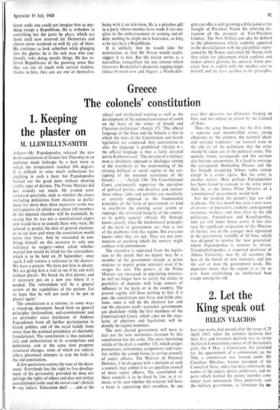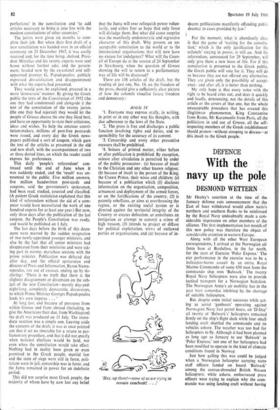2. Let the
King speak out
HELEN VLACHOS
Just two weeks had passed after the coup of. 21 April 1967, when the colonels declared that their first and foremost decision was to revise the Greek Constitution, source of all the nation's evils. On 8 May, a Constituent Act provided for he appointment of a commission; on the 30th, a commission was formed under Mr Charilaos Mitrelias, former president of the Council of State: and a few days afterwards the names of the judges, jurists, professors, and ex- perts which formed the twenty member com- mittee were announced. They undertook, said the military government, to 'eliminate the
perfections' in the constitution and 'to add articles necessary to bring it into line with the modern constitutions of other countries.'
The jurists were given six months to com- plete their job. But when their first draft of a new constitution was handed over in an official ceremony on 23 December 1967, it was coolly received and, for the time being, shelved. Presi- dent Mitrelias and his twenty experts were sent home without further ado; and the govern- ment, headed now by the ex-colonel and self- appointed premier G. Papadopoulos, publicly expressed dissatisfaction and disappointment with what the experts had presented.
They would now, he explained, proceed in a more 'democratic' manner. By giving the Greek public the texts of the Constitution of 1952 (the one they had condemned) and alongside it the text of the constitution of the twenty jurists (the one they had rejected) they would let the people of Greece choose the one they liked best, and have an opportunity to state their criticisms, ideas and wishes. To help the amateur consti- tution-makers, millions of post-free postcards were issued, and every day the Greek news- papers published a sort of coupon, which gave the text of the articles as presented in the old and new draft, with the accompaniment of two or three dotted lines, on which the reader could express his preferences.
This daily 'people's referendum' con- tinued until the end of June when it was suddenly ended, and the 'result' was an- nounced to the public. Five million answers, five million handwritten post-cards and coupons, said the government's spokesman, had been read, studied, counted and classified. (A patient Greek statistician explained that this kind ‘.4 referendum without the aid of a com- puter would have necessitated the work of one hundred experts for at least one year.) But now, only three days after the publication of the last coupon, the People's Constitution was ready, and would be published on 1 July.
The last days before the birth of this docu- ment were marred by the sudden resignation of two newly-appointed younger ministers, and also by the fact that all senior ministers had disappeared from their ministries and were tak- ing part in stormy, marathon sessions with the prime minister. Publication was delayed day after day, and the official spokesman and director of Press and Information, Byron Stama- topoulos, ran out of excuses, ending up by de- claring: 'There is no truth that there is the slightest disagreement or dissension on the sub- ject of the new Constitution—merely day-and- night-long, completely democratic, discussions, to which Prime Minister Georges Papadopoulos lends his own impetus . . . '
At long last, and because of pressures from within Greece and from abroad (including, to give the Americans their due, from Washington) the draft was produced on 11 July. The imme- diate reaction was a simple one. Leaving aside the contents of the draft, it was at once pointed out that it set no timetable for a return to par- liamentary procedure, and that it did not specify when national elections would be held, nor even when the constitution would take effect. Nothing had in reality been given or even promised to the Greek people, martial law and the state of siege were still in force, poli- ticians were in jail, censorship was in force, and the Junta remained in power for an indefinite period.
This did not surprise most Greek people, the majority of whom have by now lost any belief that the Junta will ever relinquish power volun- tarily, and either fear or hope that only force will dislodge them. But what did cause surprise was the manifestly undemocratic and regressive character of this draft. Why present an un- acceptable constitution to the world or to the international organisations that will now have no excuse for indulgence? What will the Coun- cil of Europe do at the session of 24 September in Strasbourg. when the question of Greece showing the will to return to a parliamentary way of life will be discussed?
There are 138 articles of the draft, but the reading of just one, No. 14, on the freedom of the press, should give a sufficiently clear picture of how the colonels visualise future freedom and democracy: Article 14 '1. Everyone may express orally, in writing, in print or in any other way his thoughts, with due adherence to the laws of the State.
'2. The press is free and discharges a public function involving rights and duties, and re- sponsibility for the accuracy of its content.
'3. Censorship and every other preventive measure shall be prohibited.
'4. Seizure of printed matter, either before or after publication is prohibited. By exception, seizure after circulation is permitted by order of the public prosecutor: (a) because of insult to the Christian and any other known religion; (b) because of insult to the person of the King, the Crown Prince, their wives and children; (c) because of a publication which (1) discloses information on the organisation, composition, armament and deployment of the armed forces, or on the fortifications of the country, (2) is patently rebellious, or aims at overthrowing the regime, or the existing social system or is directed against the territorial integrity of the Country or creates defeatism, or constitutes an instigation or attempt to commit a crime of high treason, (3) intends to project or diffuse for political exploitation, views of outlawed parties or organisations, and (a) because of in- 'Hey, up there—some of us are trying to remain couchant! . . decent publications manifestly offending publi. decency in cases provided by law.'
For the moment, what is abundantly clear is that the game of 'waiting for the constitu- tion,' which is the only justification for the colonels' staying in power, is still on. And the referendum, announced for 29 September, will only give them a new lease of life. For if this constitution is presented to the Greek public, the Greek public will vote for it. They will do so because they are not offered any alternative. They are given only the possibility of accept- ance: and after all, it is better than nothing.
My only hope is that every voice with the right to be heard cries out, and does it quickly and loudly, denouncing, not the details of this article or the errors of that one, but the whole unacceptable procedure that has created this illegitimate phenomenon. King Constantine from Rome, Mr Karamanlis from Paris, all the politicians in and out of Greece, all the self- respecting members of the Greek establishment should protest—without stooping to discuss—at this insult to the Greek people.







































 Previous page
Previous page